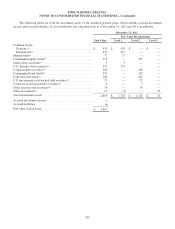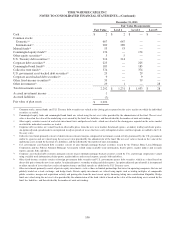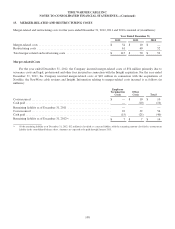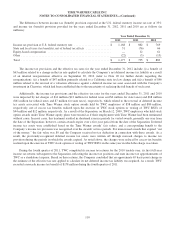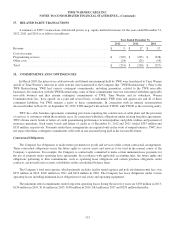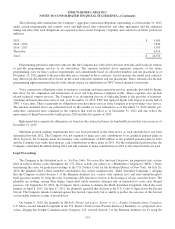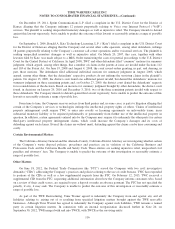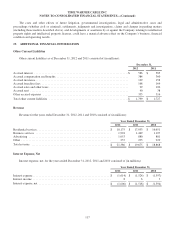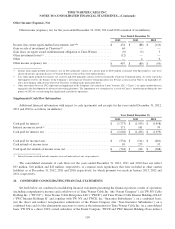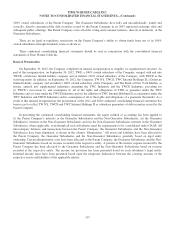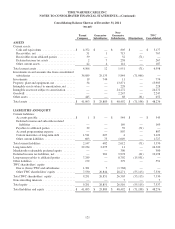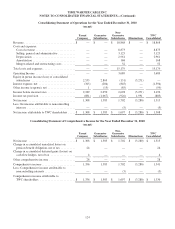Time Warner Cable 2012 Annual Report Download - page 125
Download and view the complete annual report
Please find page 125 of the 2012 Time Warner Cable annual report below. You can navigate through the pages in the report by either clicking on the pages listed below, or by using the keyword search tool below to find specific information within the annual report.TIME WARNER CABLE INC.
NOTES TO CONSOLIDATED FINANCIAL STATEMENTS—(Continued)
sales of premium cable television services to the leasing of set-top converter boxes, which is similar to the federal claim
against the Company in In re: Set-Top Cable Television Box Antitrust Litigation. The plaintiffs are seeking, among other
things, unspecified treble monetary damages and an injunction to cease such alleged practices. The Company intends to
defend against this lawsuit vigorously, but is unable to predict the outcome of this lawsuit or reasonably estimate a range of
possible loss.
On September 20, 2007, Brantley, et al. v. NBC Universal, Inc., et al. was filed in the U.S. District Court for the Central
District of California against the Company. The complaint, which also named as defendants several other cable and satellite
providers (collectively, the “distributor defendants”) as well as programming content providers (collectively, the
“programmer defendants”), alleged violations of federal antitrust laws. Among other things, the complaint alleged
coordination between and among the programmer defendants to sell and/or license programming on a “bundled” basis to the
distributor defendants, who in turn purportedly offer that programming to subscribers in packaged tiers, rather than on a per
channel (or “à la carte”) basis. In an order dated October 15, 2009, the district court dismissed the plaintiffs’ third amended
complaint with prejudice. On October 30, 2009, the plaintiffs filed a notice of appeal with the U.S. Court of Appeals for the
Ninth Circuit. On March 30, 2012, the U.S. Court of Appeals for the Ninth Circuit affirmed the district court’s dismissal of
the plaintiffs’ lawsuit. On August 2, 2012, the plaintiffs filed a petition for writ of certiorari to review with the U.S. Supreme
Court and, on November 5, 2012, the U.S. Supreme Court denied the plaintiffs’ petition.
On August 7, 2009, the plaintiffs in Jessica Fink, et al. v. Time Warner Cable Inc., filed an amended complaint in a
purported class action in the U.S. District Court for the Southern District of New York alleging that the Company uses a
throttling technique which intentionally delays and/or blocks a user’s high-speed data service. The plaintiffs are seeking
unspecified monetary damages, injunctive relief and attorneys’ fees. On December 23, 2011, the district court granted with
prejudice the Company’s motion to dismiss the plaintiffs’ second amended complaint. On January 23, 2012, the plaintiffs
appealed this decision to the U.S. Court of Appeals for the Second Circuit. The Company intends to defend against this
lawsuit vigorously, but is unable to predict the outcome of this lawsuit or reasonably estimate a range of possible loss.
Certain Patent Litigation
The Company is a defendant in Motorola Mobility, Inc., et al. v. TiVo Inc. (the “Motorola Mobility Lawsuit”). On
February 25, 2011, Motorola Mobility, Inc. (“Motorola Mobility”) and General Instrument Corporation, a subsidiary of
Motorola Mobility, filed a complaint against TiVo Inc. (“TiVo”) in the U.S. District Court for the Eastern District of Texas,
alleging infringement of three Motorola Mobility patents by TiVo digital video recorder (“DVR”) products and requesting a
declaration that patents of TiVo are invalid and not infringed by certain Motorola Mobility DVR products. Motorola
Mobility and General Instrument Corporation are seeking, among other things, unspecified monetary damages and a
permanent injunction. On March 26, 2012, TiVo filed amended counterclaims adding the Company as a defendant to the
lawsuit and a new patent claim. TiVo is seeking, among other things, unspecified monetary damages and a permanent
injunction. On May 17, 2012, the Company filed a motion to dismiss TiVo’s claims against it for failure to state a claim and,
on May 20, 2012, the Company filed a motion to sever and stay TiVo’s claims against it. On June 29, 2012, TiVo served the
Company with infringement contentions alleging infringement by the Company based on its use of Motorola Mobility DVR
products and Cisco Systems, Inc. (“Cisco”) DVR products. On July 18, 2012, the court denied the Company’s request to
sever and stay TiVo’s claims against the Company relating to the Motorola Mobility DVR products, and it severed TiVo’s
claims against the Company relating to the Cisco DVR products from the Motorola Mobility Lawsuit and ordered that the
Company be added as a party to TiVo Inc. v. Cisco Systems, Inc., discussed below. The Company intends to defend against
the Motorola Mobility Lawsuit vigorously, but is unable to predict the outcome of this lawsuit or reasonably estimate a range
of possible loss.
On June 4, 2012, TiVo filed a complaint against Cisco in the U.S. District Court for the Eastern District of Texas,
alleging infringement of four TiVo patents by Cisco DVR products and seeking unspecified monetary damages and a
permanent injunction (the “Cisco Lawsuit”). As stated above, on July 18, 2012, the court ordered that the Company be added
as a party to the Cisco Lawsuit. On August 15, 2012, TiVo served the Company with infringement contentions alleging
infringement by the Company based on its use of Cisco DVR products. The Company intends to defend against the Cisco
Lawsuit vigorously, but is unable to predict the outcome of this lawsuit or reasonably estimate a range of possible loss.
115


